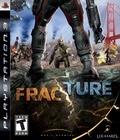Genre: Action/Shooter
Publisher: LucasArts
Developer: Day 1 Studios
Release Date: Summer 2008
First announced back in May, LucasArts'original IP Fracture has been gaining hype for its unique emphasis on nonstop terrain deformation, as each weapon and absurdly powerful grenade in the game can reshape the very ground upon which you stand. Fracture will pit the Atlantic Alliance and Pacificans against each other in a bleak, war-torn vision of America in the year 2161.
The ability to raise and lower the earth will factor heavily into any mode of play, but the biggest concern is likely to be how it affects multiplayer gameplay, as up to 16 players will be simultaneously shifting the virtual sandstone. Though another year of development remains, LucasArts and Day 1 Studios invited us to a private multiplayer gathering on the second day of the E3 Media & Business Summit to get our first hands-on time with the game, as well as a taste of how chaotic the online battlefields will become next summer.
Fracture uses a third-person, behind-the-right-shoulder perspective similar to that seen in Resident Evil 4 and Gears of War, and the game type we played at the event was a fairly standard deathmatch mode. However, very little else in Fracture can be described as "standard." Terrain deformation isn't just in there for laughs — it's meant to provide a strategic advantage to those smart enough to not only go for the kill, but try to get above their opponents. How much of a vertical advantage you gain may ultimately depend on your grenade of choice.
Four grenade types will be included in Fracture, with each selected by a different press on the d-pad, then thrown with the left trigger (L2 on the SixAxis). Tectonic grenades will raise the ground where they explode, while Subsonic grenades will create a nice crater in their wake. Spike grenades, in a feat of amazing implausibility, launch a massive pillar from the ground, allowing players the ability to launch themselves into the air and have a fantastic sniping position in the middle of a hectic battlefield.
Vortex grenades absolutely steal the show, launching a massive whirlwind that devastates every enemy and structure in its wake. However, it also devastates the hardware a bit, due to the incredible processing power necessary to render the destruction. The Vortex would often cause the Xbox 360 units to chug mightily, especially if more than one was active at the same time. At one point, a producer hilariously quipped, "Right now, the Xbox is screaming for help." Presumably, such issues will be cleared up within the next year, as the current build clearly has not been optimized in any way, shape, or form.
While the grenades pack the most consistent devastation, each firearm can also deform the natural terrain. We tried out the Bangalore (rocket launcher) and the Black Widow (multiple grenade launcher), as well as the starting rifles, the Pacifican Rifle (long-range, semi-automatic) and the Alliance Bulldog (short-range, fully automatic). Each weapon packs a primary and secondary fire option, though as with the grenades, only the earth can be deformed — not the artificial structures. Even a Vortex grenade that lands upon the remnants of a brick building will go to waste.
Sixteen players are expected to populate the maps in the final release, but the build prepared for the E3 event supported just six combatants. After getting the hang of the controls in the Playground, a sparse, Bay Area setting with the remnants of the Golden Gate Bridge in the background, we were unleashed upon each other in a small, multi-layered setting populated by crumbled buildings and the remnants of a fallen civilization.
Unlike our Playground experience, in which we had a full supply of each grenade to tinker with, supplies were scarce and we went foraging for the Vortex. Ultimately, in the match we played and the ones we watched, the Vortex gave its lucky owner a significant advantage, as one well-placed grenade may pick up several kills. On a small map with just five other players, it definitely seemed to be a bit too powerful, but that may not hold true in larger battles. As we said, there's still another year of development in which to balance these things out.
Aside from that, we were pretty pleased with the experience. Learning to shape the terrain to set up an attack instead of always going for the direct kill is likely to require some practice, but we're looking forward to the challenge. Fracture is currently scheduled for a Summer 2008 release on the Xbox 360 and PlayStation 3. We'll bring you more as it comes.
Preview by: Andrew Hayward
More articles about Fracture












 In addition to extraordinary weaponry that allows players to do things previously only imagined, each side of the conflict, Pacifica and the Atlantic Alliance, boast soldiers with powers beyond those of ordinary men. Genetic augmentations provide Pacifican forces with amazing abilities, while Atlantic Alliance soldiers like Briggs counter the threat with the more "traditional" method: cybernetics. The differing states of superhumanity result in balanced yet stylistically different combat tactics that have never been seen before.
In addition to extraordinary weaponry that allows players to do things previously only imagined, each side of the conflict, Pacifica and the Atlantic Alliance, boast soldiers with powers beyond those of ordinary men. Genetic augmentations provide Pacifican forces with amazing abilities, while Atlantic Alliance soldiers like Briggs counter the threat with the more "traditional" method: cybernetics. The differing states of superhumanity result in balanced yet stylistically different combat tactics that have never been seen before.








